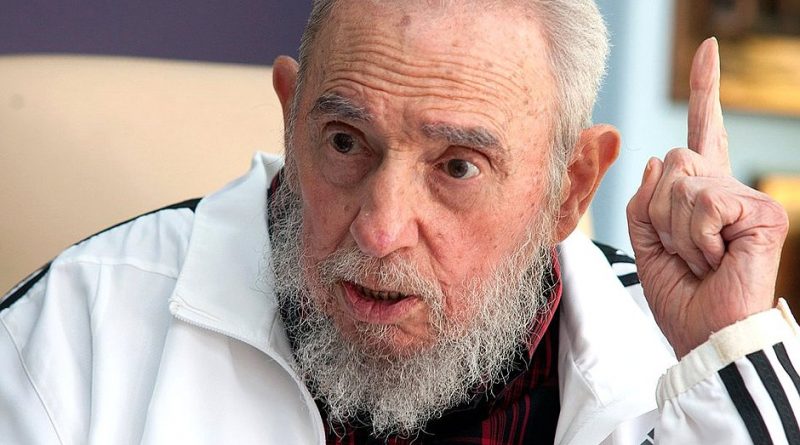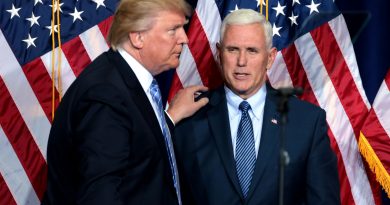¿Cómo le decimos adiós a Fidel?: World Leaders React
Cuba has declared nine days of national mourning over the death of communist revolutionary and former leader Fidel Castro, whose passing was announced late last Friday (November 25) by his brother Raúl, triggering a series of mixed reactions all over the world. Below, we gathered some of the reflections and tributes from political leaders around the world.
United States (Barack Obama) and Donald Trump)
Barack Obama and Donald Trump presented opposing responses to the death of El Comandante. The American President extended the Cuban people “a hand of friendship”, and claimed that history would record and judge Fidel Castro’s incredible influence on the citizens of his country and the world. He ended his statement by remembering that Cuba has a partner and a friend in the United States of America.
President-elect Donald Trump, on the other hand, celebrated the death of the former Cuban leader, whom he described as a “brutal dictator” whose legacy is one of “firing squads, theft, unimaginable suffering, poverty, and denial of fundamental human rights.” He also shared his hope of one day seeing a free, prosperous Cuba, a goal for which his Administration would put every effort to achieve.
Russia (Vladimir Putin)
The Russian President extended the Cuban government and its people his condolences over the death of their revolutionary leader, whose memory would “forever remain within the hearts of Russian citizens.” Describing Fidel Castro as an inspiration, Putin also acknowledged him as a symbol of an entire era of the contemporary world history.
China (Xi Jinping)
The Chinese President was among the first world leaders to react to news of Castro’s death. In a message read during the evening news segment of the state’s main television broadcaster, Xi Jinping described his comrade as a ‘great man’ that history and people would remember forever.
North Korea (Kim Jong-un)
According to the state controlled North Korean Central News Agency, the Supreme leader Kim Jong-un has sent a message to Raúl Castro expressing his condolences over the death of an “outstanding leader”, who made distinguished contributions in the fight against imperialism. He further noted that comrade Fidel Castro had established a social system where, for the first time in the Western Hemisphere, the people had become “the genuine masters”, and claimed that his feats would forever remain in the hearts of “progressive mankind.”
Canada (Justin Trudeau)
In an announcement that has already drawn significant national criticism, Justin Trudeau offered his regret over the death of the late President, whom he described as a “remarkable leader”, and proceeded to emphasize the significant progress in education in healthcare that occurred in Cuba over his guidance. He also recognized Fidel Castro’s love and dedication for his citizens, his talent as an orator, and his legendary status as a revolutionary.
France (François Hollande)
François Hollande described Castro as an immense figure of the 20th century who embodied the Cuban revolution, in both its hopes and delusions. The French President also remembered that France had always opposed the US-Cuba embargo and expressed his satisfaction over the recent rapprochement between Washington D.C. and Havana.
Portugal (Marcelo Rebelo de Sousa)
The Portuguese President offered his condolences to Raúl Castro and the people of Cuba, and remembered his meeting with the late revolutionary a month ago, where they discussed the relationship between the two countries through social, cultural, and economic lens.
Spain (King Filipe VI)
The Spanish King extended his condolences to the Cuban authorities, government and family of Fidel Castro, whom he described as a figure of undeniable historical meaning, and emphasized the close relations between the two countries
Vatican (Pope Francis)
In a telegram sent to Raúl Castro, Pope Francis offered his prayers, and expressed his sentiments of sorrow to the family of the late Cuban President and to the people of the Island nation. The Communist leader met with three popes in his lifetime, namely John Paul II, Benedict XVI and Pope Francis, and the latter is said to have played a key role in the restoration of diplomatic ties between the US and Cuba.
Venezuela (Nicolás Maduro)
In representation of one of Cuba’s most intimate and loyal allied countries, the Bolivian President phoned President Raúl Castro to extend his solidarity and love to the people of Cuba. Nicolás Maduro – who, like his predecessor Chavez, idolized El Comandante – explained that the two figures showed the way of liberation to their peoples and, as a result, were absolved by history. He also invited all the revolutionaries of the world to follow Castro’s legacy and carry his flag of independence.
Bolivia (Evo Morales)
Speaking from the country where Ernesto ‘Che’ Guevara died while trying export the Cuban revolution, Evo Morales announced in the morning that followed the death of Fidel that he would travel to Cuba. A close friend of the late revolutionary, the Bolivian President expressed his pain over the departure of a ‘giant of history’ who taught the peoples of the world to never surrender, and always speak loudly against policies of invasion and world domination.
Mexico (Enrique Peña Nieto)
The Mexican President took to twitter to express his regret over the death of Fidel Castro, whom he described as an emblematic reference of the 20th century, and a friend of Mexico, with which he had a relationship based on respect, dialogue and solidarity.
European Union (Jean-Claude Juncker and Federica Mogherini)
Like President Obama, the President of the European Commission Jean-Claude Juncker stated that Castro’s legacy would be judged by history. Describing him as “one of the revolutionary figures of the 20th century,” Juncker emphasized the fact that Fidel Castro changed the course of his country, and that his influence was felt far beyond the borders of the island nation.
Federica Mogherini, the EU’s foreign policy chief, defined Castro as a “man of determination and an historical figure” who passed away during a time when his country goes through significant changes. She also remembered that the EU has recently opened a new chapter in its relations with Cuba, and that the European Union will “keep bringing forward its strong engagement with Cuba.”
United Nations (Ban Ki-moon)
UN Secretary-General Ban Ki-moon expressed his regret over the death of the late revolutionary, and extended the support of the UN to work alongside the people of Cuba. He also highlighted Castro’s accomplishments in bringing progress to his country in the fields of education, literacy and health, and shared his hope that Cuba “will continue to advance on a path of reform and greater prosperity”. In a later statement, Ban Ki-moon added that Fidel Castro’s ideals and strong voice left few indifferent, as witnessed in global discussions at the UN General Assembly.
Fidel Castro, Photo by Kremlin / CC BY 4.0
![]() This work is licensed under a Creative Commons Attribution-NonCommercial-ShareAlike 4.0 International License.
This work is licensed under a Creative Commons Attribution-NonCommercial-ShareAlike 4.0 International License.




